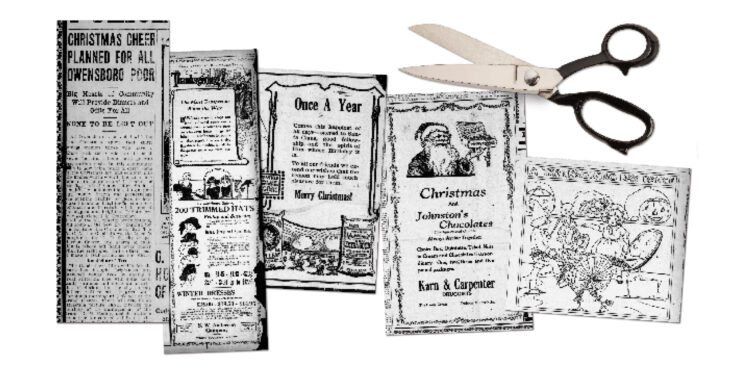It’s hard enough to believe that another holiday season has rolled around since last year – and even harder to imagine that our ancestors shared the same experience 100 years ago.
Residents of Owensboro celebrated Thanksgiving Day 1922 with a dance hosted by the American Legion at the Rudd House. The event promised “the most elaborate entertainment of the holiday season,” with “carnival favors and an attractive musical and dance program.”
And really, how could anyone resist a dance with music furnished by the Kentuckians Clarinet-Saxophone Orchestra?
Special guests for the evening were members of the Owensboro and Henderson football teams: Fierce rivals on the field, but coming together for a good cause as proceeds from the event would benefit war veterans.
Yes, there was a lot for which to be thankful 100 years ago, as noted in an advertisement from S.W. Anderson Co. (“Where Courtesy Reigns”). Along with touting an “extraordinary sale” of 200 trimmed hats – in dress, street and sport styles, with prices ranging from 98 cents to $12.45 – the ad gratefully acknowledged this season as “the most prosperous since the war,” noting “Business is good, crops are good, industrial peace seems assured, living is easier and prospects for even better things are bright.”
But trust Washington, D.C. to cast a cloud over otherwise sunny skies. Legislators had threatened to keep the Senate in session on Thanksgiving Day to wage a “finish fight” to pass the Dyer anti-lynching bill … which had been originally proposed in 1918. Looking back through the lens of history, it’s hard to imagine what the arguments against such a bill might have been. For what it’s worth, the bill was ultimately defeated in December 1922. There’s not much to be thankful for there, but in the meantime, we will move along to the Christmas season of 1922.
A headline in the December 17 issue of the Messenger-Inquirer noted a “spirit of fun” that filled the air, especially among downtown shoppers. Merchants extended their hours until 9:30 p.m. to accommodate customers who worked during the daytime – as well as “tailenders” who had simply procrastinated on their shopping.
The same article also mentioned that stores were packed with crowds who added to the burdens of overworked, frazzled clerks, observing that “it seems generally useless to urge people to give consideration to such members of the animal kingdom.” Not sure how referring to clerks as “members of the animal kingdom” inspired respect among readers, but elsewhere in this issue, there are articles focusing on a more charitable aspect of the holiday season.
A large sketch depicts a little girl sitting in a room crowded with toys of all descriptions, putting the finishing touches on a letter to Santa listing all the things she hopes (and expects) to find under her tree on Christmas morning.
That drawing is paired with one of three children staring longingly into the window of a store displaying toys that clearly will not be coming down the chimney at their humble home – along with a gentle observation to the reader that “It isn’t likely you’ll forget any who have plenty … but what about those who have nothing?”
Yes, the “big hearts” of our community promised to provide “dinners and gifts for all,” as “Christmas cheer (is) planned for all Owensboro poor” with “none to be left out.”
Among the organizations demonstrating the true spirit of the season were the Goodfellows Club, which would host a celebration at the Grand Theater on Christmas morning while also providing “decorations for a tree for colored children” at Fourth Street Baptist Church. The Woman’s Christian Association was busily distributing baskets of “material for a substantial Christmas dinner and several other meals,” while the Queen’s Daughters were working on baskets of their own, filled with dressed chickens, Irish potatoes, coffee, sugar, bread, a sack of flour and canned goods.
Residents of the county infirmary and the Mary Kendall Home had been “adopted” by Central Presbyterian and Settle Memorial churches, respectively, while residents of the Confederate Veterans home in Pewee Valley would be remembered with gifts of fruit, candy and tobacco.
In the meantime, a long list of Christmas services hosted by churches of all denominations – Baptist, Catholic, Presbyterian, Evangelical, Scientist, Episcopal, Holy Orthodox and others – extended an invitation to everyone to take time to honor the true reason for the season …
… which is as true today as it was 100 years ago, or 2,000 years ago, and will be true for as long as time is measured.










